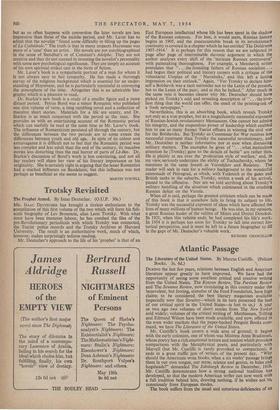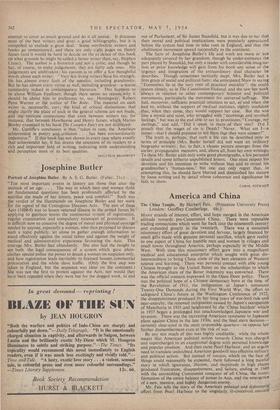Atlantic Passage
DURING the last few years, relations between English and American literature appear greatly to have improved. We have had the opportunity of seeing some excellent critical and creative writing from the United States. The Kenyon Review, The Partisan Review and The Sewanee Review, now circulating in this country under the benevolent, but forcing, stimulus of the Ford Foundation, have high claims to be considered the best literary magazines available (especially now that Scrutiny—which in its turn presented the best of our critical spirit in the United States—is lost to us.) A year or two ago two volumes of short stories from The New Yorker sold widely; volumes of the critical writing of Matthiessen, Trilling and Edmund Wilson have been made available, and now, offered in the even wider markets that the paper-backed Penguin Books com- mand, we have The Literature of the United States. Mr. Cunliffe's book covers a wide area of ground; it begins with the early colonists, one of whom was Mistress Anne Bradstreet, whose poetry has a rich emotional texture and tension which provokes comparisons with the Metaphysical poets, and particularly with Marvell (but Mr. Cunliffe is rarely provoked to comparison); it ends in a great traffic jam of writers of the present day. "Why should the Americans write books, when a six weeks' passage brings them in our own tongue, our sense, science and genius, in bales and hogsheads'?" demanded The Edinburgh Review in December, 1818. Mr. Cunliffe demonstrates how a strong national tradition has developed, so that the modern American writer can now work with a full tradition behind him, drawing nothing, if he wishes not to, consciously from European modes. The book suffers from the usual and notorious deficiencies of an attempt to cover so much ground and do it all justice. It discusses most of the best writers and gives a good bibliography, but it is compelled to exclude a. great deal. Some worthwhile writers and books go unmentioned, and 'there are only eight pages on Henry, James (and it would be hard to decide on the evklence of this book on what grounds he might be called a better writer than, say, Stephen Crane). The author is a historian and not a critic, and though he has, of course, to make judgements, they are fairly safe ones. His judgements are ambivalent ; his custom is to offer a few, thoughtful words about each writer. "Very few living writers have his strength. He has almost every fault of the novelist, including grandiosity. But he has almost every virtue as well, including grandeur—a scarce commodity indeed in contemporary literature." This happens to be about William Faulkner, though there seems no rettson,,why it should be about him in preference to, say, HemingwaY, Robert Penn Warren or the author of The Robe. The material on each writer is, necessarily, curt; the kind of critical distinctions that might clarify the place of each in the general scheme are not made, and the: intricate connections that exist between writers (as, for instance, that between Hawthorne and Henry James, which Marius Bewley examined in his book The Complex Fate) are not displayed.
Mr. Cunliffe's conclusion is that, "taken in sum, the American achievement in poetry and. criticism . . . has been extraordinarily impressive." If this book has not shown in every case where exactly that achievement lay, it has drawn the attention of its readers to a rich and important field of writing, indicating with understanding and perception most of its best qualities.
MALCOLM BRADBURY











































 Previous page
Previous page